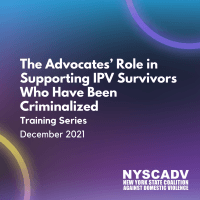Since our inception, NYSCADV has worked to provide ever evolving programmatic support to member programs in the provision of trauma-informed, survivor-centered domestic violence services. Increasing accessibility to programs continues to be a primary focus of the work that we do. In these ongoing efforts, we have gathered feedback from member programs and other stakeholders requesting more targeted, issue specific approaches to issues of accessibility. It is with excitement that we now introduce a comprehensive umbrella project that supports our member programs in their ongoing efforts to ensure that the services they provide meet the unique needs of all individuals and families who have been victimized by an abuser.
Effecting social change requires vigilance and ongoing self-assessment to ensure that we are trauma-informed, survivor-centered and meeting the needs of all victims who want domestic violence services. This project will include:
- Opportunities for all levels of member program staff and volunteers to increase their knowledge base regarding the unique needs of individuals and groups from historically marginalized communities.
- Guidance for member programs to review and evaluate the accessibility of their programs to everyone who has been victimized by an abuser.
- Support for member programs to create the change necessary to improve their accessibility.
Feedback from stakeholders across the state indicates that domestic violence services are, at times, very limited for many people. Lack of access endangers people even further, causing retraumatization. The ultimate goal of this project is to reduce the potential for domestic violence services to be offered in a manner that is limiting or retraumatizing to those that have been victimized by an abuser.
Additionally, we know that certain policies and procedures have developed over the years that have unintentionally resulted in practices that deny services to those clearly in need. These practices have developed under the pressure of the expectations and assumptions from funders, systems, and community stakeholders regarding the role of “the advocates,” creating organizational pressures that result in domestic violence services that are “service driven” rather than trauma-informed and survivor-centered.
Multiple forces, well intentioned and valid in concept, have strained our survivor-centered view . Through this project, we will be conducting an analysis of practices that have shifted away from their original intentions and may have resulted in decreasing the accessibility of domestic violence services. This is a task that will require the engagement and participation of NYSCADV’s membership. We ask that programs, no matter where they fall on the spectrum of accessibility, participate in this process, as it is important to share your successes and your challenges as a way to help your peers.
This project provides opportunities for dialogue, education and action in improving services and addressing the needs of historically marginalized and underserved communities. The order in which we deliver information does not indicate that NYSCADV is prioritizing the needs of one community over another. We are aware that communities are not fixed and the people that seek our services experience multiple oppressions throughout the continuum of their lives. As such, products generated throughout the course of this project must be viewed through a lens of intersectionality.
Trainings
-
The Office of Children and Family Services (OCFS), along with Prevent Child Abuse New York (PCANY) and the New York State Coalition Against Domestic Violence (NYSCADV), are proud to announce that they have collaborated to develop a new computer-based training entitled “Adverse Childhood Experiences (ACEs) and Trauma-Informed Practice for Domestic Violence Shelter Staff.”
ACEs, as identified by the Centers for Disease Control and Prevention (CDC), are a list of 10 potentially traumatic events experienced by children under the age of 18 that include domestic violence and child abuse/neglect. It is important to understand how ACEs may impact families you serve, as well as how your work may be affected by your own ACEs. ACEs can be mitigated by Protective Factors, which you will also learn about through this training.
This training was developed to fulfill the requirements of Chapter 391 of the Laws of 2019, which requires all direct-care employees of OCFS licensed residential programs for victims of domestic violence to participate in training that will identify individuals who have experienced ACEs, develop effective strategies for assisting and interacting with such individuals, and locate programs and services to which such individuals with ACEs may be referred to help build the individual’s resilience.
-
This eLearning Course is based on a training series held in 2021. It is aimed at elevating the needs of survivors who have been criminalized as they navigate New York’s criminal justice system. Each event will probe the unique role DV advocates have in providing supports to survivors throughout their journey.




